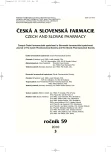-
Medical journals
- Career
A comparison of the retardation effects of natural matrix-forming polymers and the synthetic polymers Kollicoat SR and Eudragit NE
Authors: B. Vladovičová 1; V. Kormanová 1; M. Vítková 2; Ž. Bezáková 3; M. Žabka 2
Authors‘ workplace: Zentiva a. s., Hlohovec, Slovenská republika 1; Univerzita Komenského v Bratislave, Farmaceutická fakulta, Katedra galenickej farmácie, Slovenská republika 2; Univerzita Komenského v Bratislave, Farmaceutická fakulta, Katedra farmaceutickej chémie, Slovenská republika 3
Published in: Čes. slov. Farm., 2010; 59, 127-134
Category: Original Articles
Overview
The formulation of modified-release dosage forms optimizes the pharmacokinetic profile of the drug, reduces the fluctuations of plasmatic concentration, increases the drug benefit and improves the patient’s compliance. Modification of the characteristics of the controlled membrane enables to achieve the desired drug release profile. The matrix system and/or the multiple unit dosage form provide a reliable guaranty of the controlled delivery of the drug from the modified-release dosage form. Both above-mentioned formulations were prepared and evaluated in this experimental study. The aim of the study was the preparation of a modified-release dosage form containing trimetazidine by applying matrix-forming hydrophobic and hydrophilic polymers and their comparison with the synthetic film-forming hydrophobic polymers Eudragit® NE and Kollicoat® SR. Glycerolbehenas as the control release polymer showed a low effect. Drug release was significantly prolonged by natural polymers, and the effect of alginate sodium was more significant in comparison with carrageenan. A reservoir system containing both polymers under study is suitable for the formulation of a CR dosage form.
Key words:
trimetazidine – alginate sodium – carrageenan – Eudragit® NE – Kollicoat® SR
Sources
1. Tapia, C., Ormazabal, V., Costa, E., Yazdani-Pedram, M.: Study of dissolution behaviour of matrices tablets based on alginate-gelatin mixtures as prolonged dlitiazem hydrochloride release systems. Drug Dev. Ind. Pharm., 2007 33, 585–593.
2. Chan, L. W., Ching, A. L., Liew, C. V., Heng, P. W. S.: Mechanistic study on hydration and drug release behavior of sodium alginate compacts. Dev. Ind. Pharm., 2007 33, 667–676.
3. Liew, C. V., Chan, L. V., Ching, A. L., Heng, P. W. S.: Evaluation of sodium alginate as drug release modifier in matrix tablets. Int. J. Pharm., 2006 309, 25–37.
4. Bani-Jaber, A., Al-Ghazawi, M.: Drug Development and Industrial Pharmacy, 2005 31, 241–247.
5. Coviello, T., Matricardi, P., Marianecci, C., Alhaique, F.: Polyssaccharide hydrogels for modified release formulations. J. Control. Release, 2007 119, 5–24.
6. Gupta, V. K., Hariharan, M., Wheatley, T. A., Price, J. C.: Controlled-release tablets from carrageenans: effect of formulation, storage and dissolution factors. Eur. J. Pharm. Biopharm., 2001 51, 241–248.
7. Carlin, B., Li, J-X., Felton, L. A.: Pseudolatex dispersion for controlled drug delivery. In: Felton, L. A. Aqueous polymeric coatings for pharmaceutical dosage forms. Vol. 176. New York: Informa Healthcare USA 2008.
8. Skalsky, B., Petereit, H. U.: Chemistry and application properties of polymethacrylate systems. In: Felton, L. A. Aqueous polymeric coatings for pharmaceutical dosage forms. Vol. 176. New York: Informa Healthcare USA 2008.
9. Lin, A. Z., Muhamad, N. A., Pope, D., Ausburger, L. L.: Study of the effect of curing and storage conditions on controlled repase diphenhydramine HCl pellets coated with Eudragit NE 30 D. Pharm. Develop. Technol., 2003 8, 277–287.
10. Dashevsky, A., Wagner, K., Kolter, K., Bodmeier, R.: Physicochemical and release properties of pellets coated with Kollicoat® SR 30 D, a new aqueous polyvinyl acetate dispersion for extended release. Int. J. Pharm., 2005 290, 15–23.
11. Flick, D., Kolter, K.: Polyvinylacetate dispersion. Development of sustained-release pharmaceutical dosage forms by granulation and tableting. Pharm. Techn., 2003 27, 86–100.
Labels
Pharmacy Clinical pharmacology
Article was published inCzech and Slovak Pharmacy

2010 Issue 3-
All articles in this issue
- Analytical methods for the determination of selected psychopharmaceuticals
- Pyrazinecarboxylic acid derivatives as effective abiotic elicitors of isoflavonoids production
- Influence of the kind of polymer on chlorhexidine liberation from hydrogel
- A comparison of the retardation effects of natural matrix-forming polymers and the synthetic polymers Kollicoat SR and Eudragit NE
- Effects of aluminium chloride on cell growth and production of coumarins in cell suspension cultures of Angelica archangelica L.
- Czech and Slovak Pharmacy
- Journal archive
- Current issue
- Online only
- About the journal
Most read in this issue- Analytical methods for the determination of selected psychopharmaceuticals
- A comparison of the retardation effects of natural matrix-forming polymers and the synthetic polymers Kollicoat SR and Eudragit NE
- Influence of the kind of polymer on chlorhexidine liberation from hydrogel
- Pyrazinecarboxylic acid derivatives as effective abiotic elicitors of isoflavonoids production
Login#ADS_BOTTOM_SCRIPTS#Forgotten passwordEnter the email address that you registered with. We will send you instructions on how to set a new password.
- Career

